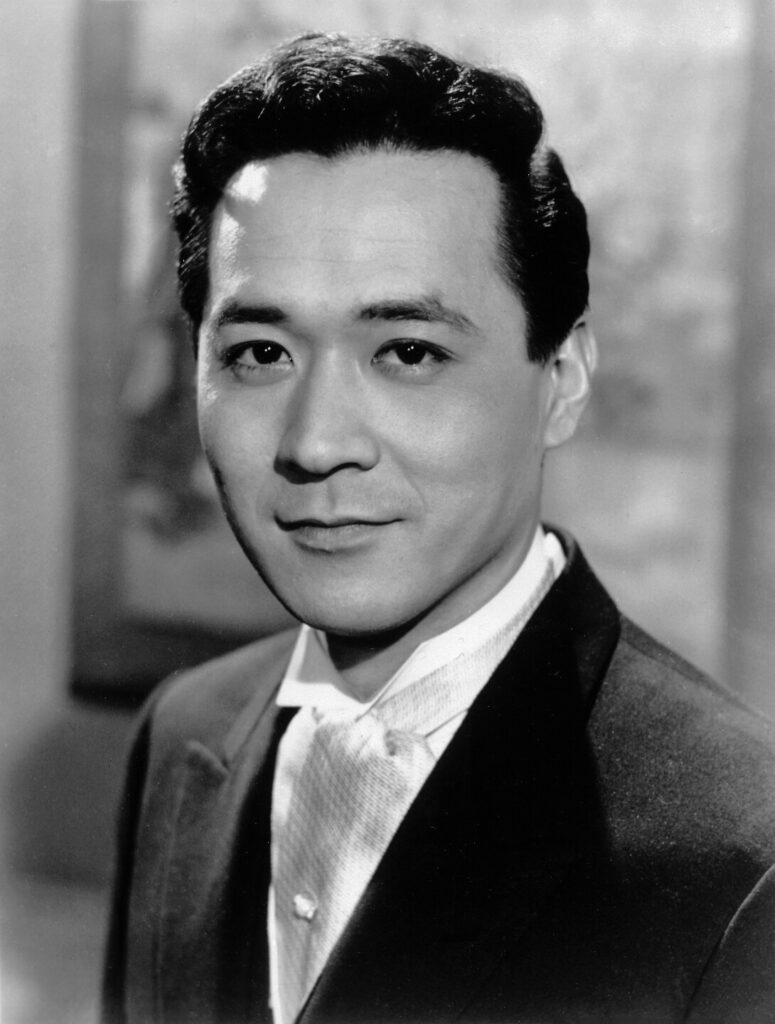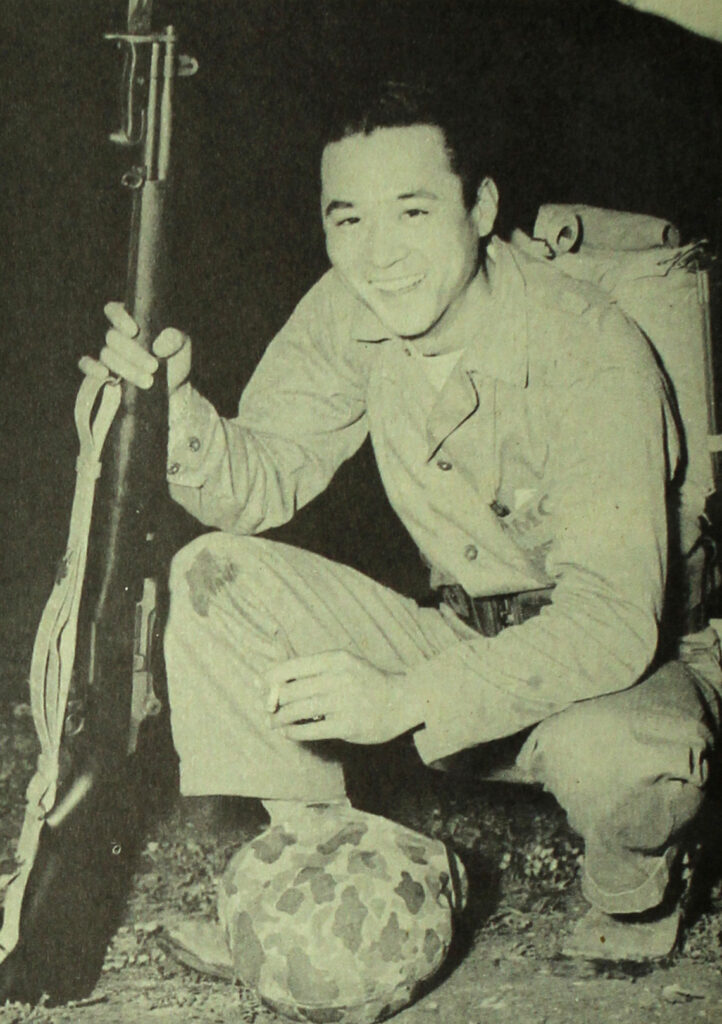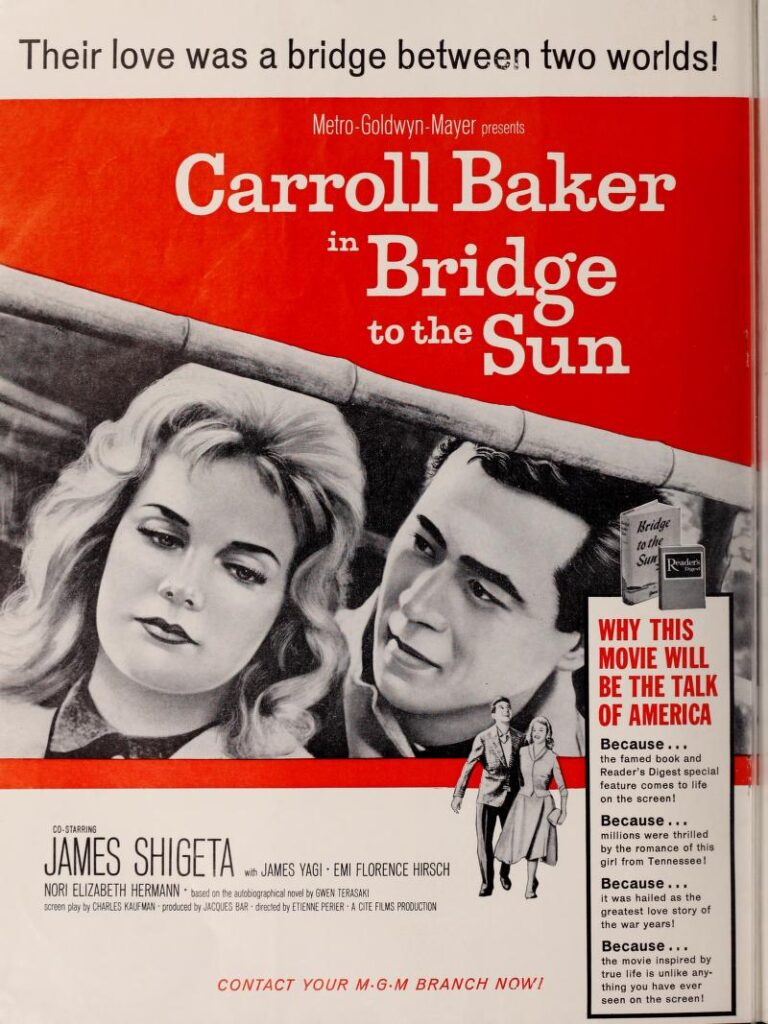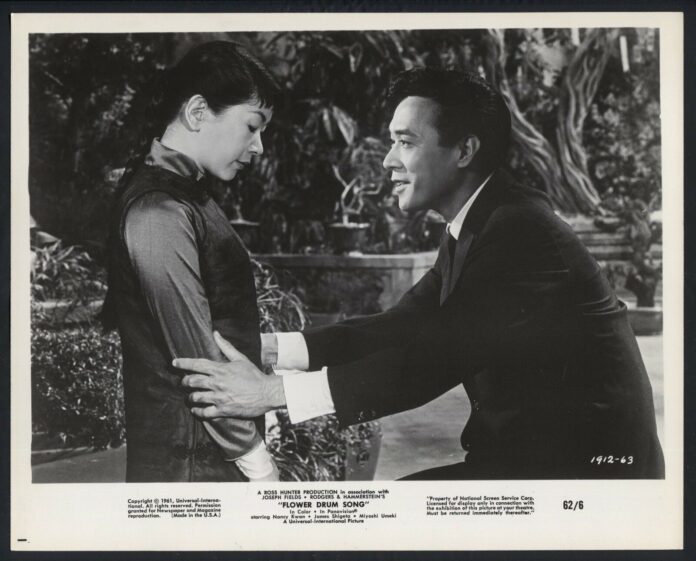By Raymond Douglas Chong, AsAmNews Writer
James Saburo Shigeta became Hollywood’s pioneer Asian American heartthrob during the late 20th century. He played the romantic lead actor Wang Ta in Flower Drum Song. For a brief eon, 1959 to 1961, his Hollywood star shined on the silver screen under the fading studio system.
James Borges, the legendary Hawaiian jazz vocalist, said Jimmy was more than just a handsome Japanese man with a great voice; Jimmy opened the door for people of color. Fans remembered his masculine presence and baritone vocals. Colleagues, friends, and relatives knew Shigeta as warm and kind but also very shy, despite his Hollywood fame.
James Shigeta was one of his era’s most handsome, talented, classy, and dignified actors. He had a great voice and was an incredible singer. James, you will be missed but will live on in the wonderful legacy you have left the world.” mused the late Jeff Adachi, director of THE SLANTED SCREEN documentary.
Before the advent of sound film, the world knew Sessue Hayakawa, the Japanese actor, as the Asian heartthrob of Hollywood during the silent film era.
Hawaii
Born in Honolulu, on June 17, 1929, Shigeta, a third-generation Japanese American or Sansei, had five siblings. Howard Koichi Shigeta, his father, and Satoko Shigeta, his mother, raised him.
His father, born on January 31, 1896, at Hana on the island of Maui, worked as a laborer on a cane sugar plantation. Then, he served as a US Army private during World War I. He finished his career as a plumber working in Honolulu.
Denkichi Shigeta, grandfather, an Issei (first-generation Japanese American), was born about 1862. He arrived aboard Taksago Maru steamship in the Kingdom of Hawaii on June 12, 1888, from Oshima, an island town of Yamaguchi Prefecture, imperial Japan… He worked as a laborer at a cane sugar plantation.
His famous grandson attended President Roosevelt High School in Honolulu at Makiki’s Kalāwahine Valley. He participated with Civitas Romana, Les Causeurs Cadets, Chevrons Club, and Track. He graduated in 1947.
Shigeta attended the University of Hawaii, the University of Southern California, and New York University majoring in English. But he never got his bachelor’s degree. During his formative years, he sang in the Capella choir while learning the arts of acting and singing. He played on stage with Honolulu Theater. He soloed with classics at Honolulu Symphony Orchestra and with pops at Honolulu Pops Orchestra, with his baritone vocal. He also played the piano.

Budding Star in Hollywood
In June 1950, at New York City’s Madison Garden, James Shigeta competed in Ted Mack’s The Original Amateur Hour on American Broadcasting Company television. He sang Night and Day and won the grand prize of $2,000.
He then went to Hollywood as a contract actor for Metro-Goldwyn-Mayer Studios (MGM). He auditioned for screen tests but never landed a role in the films at that time. He appeared on radio, television, and stage shows. The Big Five studios in Hollywood were: Warner Brothers, MGM, 20th Century Fox, Paramount Pictures, and RKO Pictures. They controlled all aspects of their film productions. They contracted all personnel, including actors, crew, directors, and writers.
In 1951, Shigeta teamed with Charles Keonaonalaulani Llewellyn Davis, a native Hawaiian operatic tenor. Due to racial sensibility, they became known as CHARLES DURAND (Davis) and GUY BRION (Shigeta), They sang on the supper club circuit across the USA. They debuted at Mocambo on Sunset in Hollywood. Las Vegas. Night clubbers saw them at Flamingo in Las Vegas and Palmer House in Chicago.

In late 1951, the US Marine Corps drafted Shigeta amidst the Korean War. He trained at Marine Corps Base Camp Pendleton at Oceanside, California. He qualified as a sharpshooter. During his service, he entertained the troops. In 1954, the US Marine Corps discharged Shigeta as a Sergeant.
Japanese Star
After his discharge, Shigeta appeared in Japan from 1954 to 1959. Toho Company hired him to sing on their studio radio and television shows, theater stage shows, and to record songs. Toho Company, the top Japanese film, theater production, and distribution company, nicknamed Shigeta the Frank Sinatra of Japan. He recorded albums. His Japanese version of Love Letters In The Sand, a classic, became a top hit in 1957.
Shigeta sang Enchanted Waltz from the Red and White Song Battle show.
At the famous Nichigeki (Nippon Theater) in Tokyo, Shigeta appeared as the lead singer in an ensemble revue, Autumn Dance. He sang Puerto Rican Hussy, Cuban in Me, Love Letters in the Sand, and Dream of Chrysanthemums.
In 1958, he toured Australia in another ensemble revue, The Cherry Blossom Show. He sang: Jamaican Hussy, Orchids and Moonlight, Love Letters in the Sand, and Dream of Chrysanthemums.
Rising Star in Hollywood
Shigeta shined as a rising star, the first Asian American to act in the Hollywood studio star system. The studios groomed him as a romantic leading man. He encountered white American stigma against Asian American men with crude stereotypes and restricted roles. Miscegenation between Asian American men and white American women was taboo.
Americans feared the Yellow Peril – that Orientals were an evil danger to the Western world. Warner Oland, a yellowface Swedish-American actor, played Honolulu Police detective Lieutenant Charlie Chan. Anna May Wong, the first Chinese American star, auditioned for the lead role as O-Lan, in the film adaptation of Pearl Buck’s Pulitzer Prize-winning book about Chinese farmers, The Good Earth. Metro-Goldwyn-Mayer Studios casted the lead role to Luise Rainer, a German American actress in yellowface. Rainer won an Oscar for Best Actress from the Academy of Motion Picture Arts and Sciences in 1936.
At The Dinah Shore Chevy Show, February 1, 1959, on American Broadcasting Company television, Shirley MacLaine, the actress, hosted a program of Japanese performances with comedy, songs, and dances. She highlighted Shigeta as the most popular singer in Japan.
At the New Frontier Hotel on the Las Vegas Strip, Shigeta headlined Steve Parker’s Holiday In Japan, a musical revue of Japanese show business, with Shirley MacLaine. He emceed and performed as the lead singer.

As a contract actor with MGM, Columbia Pictures, and Universal Pictures, Shigeta made his breakthrough as a romantic leading man. From 1959 to 1961, he starred in five Hollywood films: The Crimson Kimono (1959), Walk Like a Dragon (1960), Cry for Happy (1961), Bridge to the Sun (1961), and Flower Drum Song (1961).
Shigeta made his Hollywood debut when he starred in Sam Fuller’s The Crimson Kimono, a film noir thriller from Columbia Pictures. He played Joe Kojaku, a Japanese American homicide detective with the Los Angeles Police Department. In the film, detective Sergeant Charlie Bancroft (played by Glen Corbett) and Kojaku investigate the murder of Sugar Torch, a burlesque queen, in Los Angeles’ Little Tokyo. Kojaku and Bancroft woo their key witness, Christine Downs (played by Victoria Shaw), an artist, in a sensational interracial love triangle. At the end, during the Nikkei Week grand parade, Downs arrives and Kojaku kisses her.
The movie poster blared:
- Yes, this is a beautiful American girl in the arms of a Japanese boy!
- A Motion Picture of Startling Frankness…Vivid Emotions
- What was his strange appeal for American girls?
For his breakthrough role in 1960, Shigeta won a Golden Globe Award in 1960 for New Star Of The Year – Actor.
In his second film, Shigeta played a romantic lead in the western, James Clavell’s Walk Like a Dragon, from Paramount Pictures. As Cheng Lu, a Chinese immigrant, in the 1870s, he competes for the love of Kim Sung (played by Nobu McCarthy), a slave girl (prostitute), with Lincoln Bartlett (played by Jack Lord), a cowboy. Bartlett brought Sung at a slave market in San Francisco Chinatown and fell in love with her. At the end, Lu and Sung leave the town together.
In 1960, Shigeta had a supporting role in a romantic comedy, William Goetz’s Cry for Happy, from Columbia Pictures. US Navy Chief Petty Officer Andy Cyphers (played by Glenn Ford) leads a US Navy photographic team that uses the Tokyo geisha house as its home during the Korean War. The movie’s tagline was: You’ll cry for happy, happy, happy when four U.S. sailors take over a geisha house…geisha girls and all! Shigeta played Suzuki, a Japanese American sailor. In the end, Suzuki marries Chiyoko (played by Miiko Taka), a geisha.

In 1960, Shigeta starred in the drama Etienne Périer’s Bridge to the Sun, from MGM, an actual story set in wartime Japan. Its tagline was: The Story That Had To Be Told! Their love was a bridge between two worlds! The movie dealt with miscegenation. He played Hidenari Terasaki, a Japanese diplomat with a Brown University education. He marries Gwendolen Terasaki nee Harold (played by Carroll Baker), a Southern lady from Tennessee. As a pacifist, Terasaki tries to prevent war between Imperial Japan and the United States. After the attack at Pearl Harbor, the Terasakis live and suffer in Japan under constant suspicion with their daughter. In the finale, Terasaki stands on the dock as the steamship sails to United States while Gwendolen gazes him across the deck.
In his most famous role as lead actor, Shigeta starred in Rodgers and Hammerstein’s Broadway musical, Henry Koster’s Flower Drum Song, from Universal-International. Its tagline was: Most joyous hit lights up the screen!
The groundbreaking musical was widely known for its Asian American ensemble and song and dance numbers. In a love quadrangle set in San Francisco Chinatown, he played Wang Ta, a modern Chinese American college student pursuing Linda Low (played by Nancy Kwan), a seductive nightclub dancer who loves Sammy Fong (played by Jack Soo), the owner of Celestial Gardens nightclub. Sammy prefers being a playboy but is engaged to marry Mei (played by Miyoshi Umeki), an illegal immigrant with Confucian traditions, Mei eventually falls in love with Wa. In the impromptu double wedding, Wa marries Mei, while Sammy marries Linda.
In the motion picture soundtrack, Shigeta, as Wa, elegantly sang You Are Beautiful to Mei. He also sang Chop Suey.
The lyrics of You Are Beautiful :
(Verse)
Along the Hwang Ho Valley, where young men walk and dream
A flower boat with singing girls came drifting down the stream
I saw the face of only one come drifting down the stream
(Chorus)
You are beautiful, small and shy
You are the girl whose eyes met mine
Just as your boat sailed by
This I know of you, nothing more
You are the girl whose eyes met mine
Passing the river shore
You are the girl whose laugh I heard
Silver and soft and bright;
Soft as the fall of lotus leaves
Brushing the air of night
While your flower boat sailed away
Gently your eyes looked back on mine
Clearly you heard me say
“You are the girl I will love someday.”
After Flower Drum Song, Shigeta’s Hollywood stardom faded to obscurity. Hollywood studios had rare roles for Asian American men. He acted in supporting roles in Hollywood films, played characters and guests on television series, and sang in theaters. He never became a true Hollywood star.
Shigeta recalled a conversation with Joe Pasternak, an MGM producer in the documentary, THE SLANTED SCREEN. I was in a class somewhere, and Joe was there, watching the class, and he turned to me, and said, ‘If you were white, you’d be a hell of a big star.’ Adachi explains, He clearly had the talent, but the roles weren’t there, because unless there was a role that was written for an Asian American, he would not be considered. And that’s the tragedy here.
James Hong, the Chinese American character actor, noted, He was so handsome, debonair. But there was the stigma in Hollywood about Asian leading men.
In 1966, Shigeta played Danny Kohana in Paradise, Hawaiian Style, a buddy of Rick Richards (Elvis Presley). Rick and Danny run a helicopter charter business while Rick flirts with the gorgeous women of Hawaii. He portrayed Vice Admiral Chuichi Nagumo of the Imperial Japanese Navy in the 1976 World War II drama Midway.
In the 1973 musical Lost Horizon, Shigeta played a monk as Brother To-Len. He sang a musical number Living Together, Growing Together.
In the 1988 action film Bruce Willis’ Die Hard, he played Joe Takegi, president of Nakatomi Trading. In a memorable scene with Hans Gruber the terrorist, Takegi bravely refuses his demands and is brutally assassinated.
Joe Takegi “You want money? What kind of terrorists are you?”
Hans Gruber “Who said we were terrorists?”
Joe Takegi “I don’t know it, I’m telling you. Get on a jet to Tokyo and ask the Chairman. I’m telling you, you’re just going to have to kill me.”
Joe Takegi “Okay.”
Hans Gruber “We do it the hard way.”
In the 1988 Disney animation Mulan, as the voice of General Li, Shigeta said, This represents discipline, and this represents strength. You need both to reach the arrow.
On stage tours, he played musical leads for Chu Chem (1966), Flower Drum Song King, and I (1978).
Albums
Shigeta recorded songs in two albums for the American market. They were jazzy pops and classic tunes.
Shigeta’s first solo album Scene One was released in 1960 by Silver Slipper Records.
SCENE ONE
- I’ve Got Somebody to Love
- Too Young to Go Steady (From ‘Strip for Action’)
- You’d Be So Nice to Come Home to (From the Film ‘Something to Shout About’)
- You’re So Precious to Me
- Evenin’
- Where Are You
- Chi-Sai-Hanna (My Little Flower)
- Dreamin’ Chair
- But Beautiful (From the Film ‘Road to Rio’)
- Hold Me
- What Is There to Say? (From ‘Ziegfeld Follies of 1934)
- They Can’t Take That Away from Me (From the Film ‘Shall We Dance’)
His next album We Speak the Same Language was issued in 1962 by Choreo.
WE SPEAK THE SAME LANGUAGE
- I Saw You Yesterday
- My Ship (From ‘Lady in the Dark’)
- To Look Upon My Love (From ‘Kean’)
- Autumn Rain
- What’s Good About Goodbye? (From the Film ‘Casbah’)
- We Speak the Same Language (From ‘All American’)
- Yes
- Soon It’s Gonna Rain (From ‘The Fantasticks’)
- This Funny World (From ‘Betsy’)
- I’ve Just Seen Her (From ‘All American’)
- Girls Like You
Legacy
Jeff Adachi featured Shigeta in his documentary, THE SLANTED SCREEN – Discover the History of Asian Men in Hollywood (2006). This film explored the portrayals of Asian men in American cinema.
Arthur Dong also featured Shigeta in his documentary, HOLLYWOOD CHINESE – The Chinese in American Feature Films (2007). In a companion book (2019), Dong interviewed Shigeta on March 14, 2005, in Los Angeles. Shigeta remarked I had no aspirations of being a blonde and the all-American boy kind of thing, you know, because I cannot play anything but Asian.
In CHINESE IN HOLLYWOOD (2013), a book about the contributions of Chinese Americans to Hollywood films, Jenny Cho pictured Shigeta in his scenes as Wang Ta in Flower Drum Song film.
In RISE – A Pop History of Asian America from the Nineties to Now (2022), Jeff Yang, Phil Yu, and Philip Wang acknowledged Shigeta as a dashing romantic lead.
Shigeta reflected: I have never personally referred to myself as a star. When asked I always say, ‘I’m an actor, a working actor.’ I think the term ‘star’ is a vastly overused expression. That term has been used in reference to me, but it is not of my own choice.
Death
Shigeta died on July 28, 2014, due to pulmonary heart failure at an assisted living facility in Beverly Hills, California. The Shigeta family held his memorial service on August 31, 2014, at Hosoi Garden Mortuary, in Honolulu. Amidst the eulogies, James Borges serenaded a photo of Shigeta with I Will Be Seeing You.
At National Memorial Cemetery of the Pacific Honolulu, Honolulu County, Hawaii, his stony urn reads:
SHIGETA
JAMES S
SGT USMC
KOREA
1929 2014
SEMPER FI
PROUDLY SERVED
In a July 6, 2006 interview, Shigeta’s advice to young Asian American actors:
There is no pat formula for success in acting… If you want to try for anything like that you follow your heart, give it all you can with passion. And the rest is really luck, being prepared for the time when something comes your way.
James Shigeta, Nichi Bei Times.
The Asian American Pacific Islander community adores James Saburo Shigeta as a true trailblazer, our pioneer Asian American heartthrob of Hollywood.
(Editor’s Note: This story has been corrected with the proper spelling of Yamaguchi Prefecture, the full name of the actor’s high school and the name of the steamship boarded to come to the United States.)

AsAmNews is incorporated in the state of California as Asian American Media, Inc and has an application for non-profit 501c3 status with the IRS pending. Check out our Instagram account. Go to our Twitter feed and Facebook page for more content. Please consider interning, joining our staff, or submitting a story, or making a financial contribution. We are committed to the highest ethical standards in journalism. Please report any typos or errors to info at AsAmNews dot com.



Don’t quite understand why Shigeta article is relevant to today. After all, he died in 2014.
The article seems stuffed with every minute little detail of his life. I stopped reading after a while. Is there really a current event need to list every song in his albums? The lyrics to a song?
A stricter editorial hand might’ve helped this article. In this case, less would certainly have been more.
Thank you, Jed, for your comments. AsAmNews believes Asian American history remains relevant today as do most of our readers. Many will be reading about James Shigeta for the first time. To understand where we are today, we need to know the past. You didn’t find the story relevant, yet you read more than 80 percent of the article.
Hi there, nice article. Some errors tho:
Denkichi Shigeta, grandfather, an Issei (first-generation Japanese American), was born about 1862. He arrived aboard the Maru steamship in the Kingdom of Hawaii on June 12, 1888, from Oshima, an island town of Yamauchi Prefecture, imperial Japan… He worked as a laborer at a cane sugar plantation.
His famous grandson attended President Theodore High School at Makiki’s Kalāwahine Valley. He participated with Civitas Romana, Les Causeurs Cadets, Chevrons Club, and Track. He graduated in 1947.
—
Which Maru? Maru simply means boat. There is a name in front of Maru.
It is YamaGUCHI Prefecture (not Yamauchi).
James Shigeta attended Roosevelt High School in Makiki.
Thank you, Stacey. The corrections have been made.
Good starting point and overview on James Shigeta
Very informative article about James Shigeta! I Did not know much about the history of Asian Americans through films. I appreciate that his work is being acknowledge and becoming a pioneer as a Asian American heartthrob in Hollywood is huge to a lot of minorities entering the film industry!
Thank you for this article! I had never heard of James Shigeta before reading this. I thought it was cool to read about how he was able to break into Hollywood before Asian Americans were cast in films. It is sad to read about his conversation with the MGM producer stating that if he was white he would have made it. It’s good to see things going in the right direction now for Asian American actors and actresses.
This article gives good detail on event that occurred in James Shigeta’s life, for anyone who wasn’t aware of him before reading this like myself it does well in covering his filmography and singing career as well as his early life and the events that happened for him to decide to pursue acting in an industry that was not so kind to Asian American actors.
This is a good movie , and this movie detail shows up for hard life for Asian at that time. Also this is the good sample for future generations, seeing the difficulties and discrimination, this struggle has brought many successes to Asian in the past.
The author takes Shigeta’s life introduction, fame, development and works, as well as death to take us to understand him in an all-round way. Through this article, I learned why Shigeta was able to achieve so much success in such an environment without being stereotyped. This is due to him identifying his position in that era and maximizing his advantages.
I enjoy how the the author explained Shigeta’s life before and during his climb up towards fame. It really help understand him but also his story and the struggles of being an Asian American with a lead role in a romantic film. He was one of the few figures that paved the way for Asian American actors.
It is interesting to find biographies of people who made it big when it was such a struggle back then. Especially for people of color, and knowing that he opened the door for them, I think that should be part of his legacy.
Thanks for shining a light on James Saburo Shigeta! People should learn more about his career and accomplishments, it’s too bad he faced discrimination and was not able to shine brighter while he was at the height of his career.
Hello Angel,
I agree that it was such a shame he faced racism and discrimination, because I believe he would have achieved much more and starred in more films. I really enjoyed reading about the way he climbed to the top and paved the way for other Asian American actors. I know movies back then were predominately white actors and actresses and its nice to see someone of color break that pattern. -Katelyn G
i like your post. He faced racism and discrimination, but James was still able to show up his talent and skill in acting, he is the good model for Asians and Asian Americans.
Wow! it’s truly inspiring how despite the odds being against him at the time, James Shigeta was still able to make a name for himself in Hollywood. This serves as a great testimony to his talent and skill in acting. Even though he was one of the first Asian American actors in Hollywood, he didn’t let that stop him from achieving great success.
Hello Devang,
Similar to you, I too thought it was remarkable and inspiring how James Shigeta was able to create a reputation for himself despite everything being against him. I found the article did an excellent job highlighting how his early years of capella and acting classes helped form and develop the skills necessary to be able to fulfill the roles characteristics.
I found this article very interesting and informal. Its satisfying to see people break societal norms and make a name for themselves such as Shigeta did. Despite being among the initial Asian American actors in Hollywood, his work is being recognized, and his emergence as an Asian American heartthrob in Hollywood holds immense significance for many individuals from minority backgrounds.
What was most inspiring to me about this article was that Shigeta not only gained stardom in Hollywood, he made a name for himself in so many industries. He recorded many albums, was popular in the Las Vegas scene, and went on tour internationally. I think it requires a lot of hard work and dedication, which Shigeta put in to see the fruits of his labor.
I found this article very informative. It’s really inspiring how James Shigeta made it in Hollywood, even when things were tough for Asian actors back then. He showed how talented he was, and that’s why he became successful. Even though there weren’t many Asian American actors in Hollywood at the time, he didn’t give up, and that’s pretty amazing.
It is quite admirable that Shigeta has been able to shatter the biases and establish a name for himself in a field where limited representations of Asian characters are the norm. His portrayals of classic characters like Wang Ta in “FLOWER DRUM SONG” showcased his acting range shattering stereotypes and further representation in Hollywood. The above article/essay does great job of summarizing Shigeta’s legacy by highlighting his influence on the entertainment sector and his struggle ( continuous) for inclusiveness and diversity. Thank you for sharing!
I enjoyed this article and the way it breaks down Shigeta life leading up to his success in Hollywood despite the stereotypes. I hope he got the recognition he deserved while he was alive, and his legacy lives since his death.
It was an insightful and informative article. The detailed description helped me grasp what kind of person he was and his impact on Asian American representation in Hollywood. It is inspiring to see him not giving up and working towards his dream, and he helped lay the ground for the next generation of Asian Americans actors in Hollywood.
the article points out Shigeta’s impact on the Asian-American community and how he served as a role model for aspiring actors of Asian descent. By breaking down barriers and challenging stereotypes, Shigeta helped pave the way for future generations of Asian-American actors to see themselves represented on screen.
James Shigeta always appears so poised and positive and never shows his antagonist attitudes towards big studios or White Americans, playing his best roles as an actor, which is admirable, using his actions to prove that Asians and Asian Americans have quality and inner strength. My salute to James Shigeta!